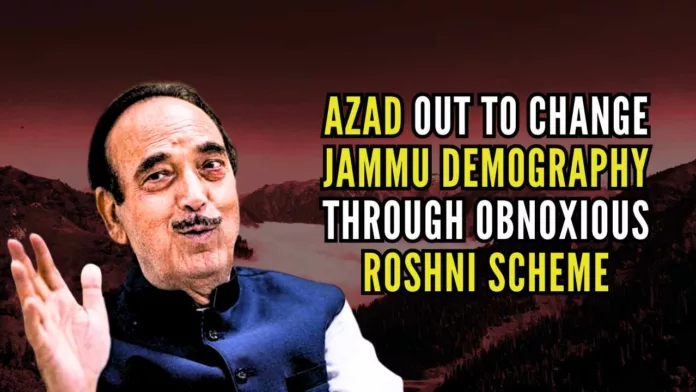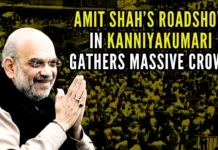
Obnoxious Roshmi Scheme
It is clear: Former J&K CM, the former Congress leader, and Leader of Opposition in Rajya Sabha and chairman of the newly-founded Democratic Progressive Azad Party (DPAP), Ghulam Nabi Bhat, alias Azad, who in 2006 advocated Indo-Pak joint-control over J&K, is out to create a Kashmir-like situation in Jammu province by changing further its demography through the obnoxious Roshni Scheme. This can be seen from his December 23 nasty reiteration.
What did the enemy of Jammu, nay the nation, Azad, say on December 23? And where did he make the atrocious reiteration? On December 23, he declared that “if elected to power, he will protect land and jobs for the locals in the J&K” by restoring the “Roshni Scheme in its real form.” “My priority is to get back the Roshni Scheme since it was largely benefiting people. The abolishing of the scheme recently has dented the economic prosperity of people. It was benefiting thousands of people and had become the source of livelihood,” he said. Ironically, he made this outrageous statement while addressing a public rally in RS Pura, Jammu, in the presence of some Jammu-based former ministers and lawmakers.
It was the Farooq Abdullah government, which started giving legal sanctity to illegal acts through legislation. It was this government that enacted the J&K State Lands (vesting of Ownership to the Occupants) Act (Act No. XII of 2001) in November 2001. Also called the Roshni (power) Act, it was enforced on March 1, 2002. The Act was amended by Mufti Mohammad Sayeed’s PDP-Congress coalition government in 2004 and by Ghulam Nabi Azad’s Congress-PDP coalition government in 2006 and 2007. Under Farooq Abdullah, 1990 was the cutoff for the encroachment on the state land. In 2004, the Mufti Sayeed government relaxed the cutoff year to 2004. During the time of Ghulam Nabi Azad, the cutoff was relaxed further to the year 2007. Under the 2007 amendment, the upper limit of 10 kanals of land that could vest in an illegal occupant by the earlier Act of 2001 was substituted by one hundred kanals.
Account general on Roshni Act
On March 8, 2014, Principal Accountant General (Audit), J&K, S C Pandey, termed the Roshni Scheme as the “biggest-ever land scam” in J&K. Addressing a press conference in Jammu, he, inter-alia, said: “Every possible attempt was made to cover up the biggest ever land scam by denying vital information for the audit and Rs.225 crore loss to the exchequer, which has come to the fore in the test checked cases, was just the tip of an iceberg…Several officers in the government hierarchy maintained a hostile attitude towards numerous communiqués from his office and this clearly indicates that they were not in favour of the Roshni scam being unearthed completely…Many heads will roll if the scam is fully unraveled as the Roshni Scheme has turned out to be beneficiary mainly for the non-deserving people due to the negative role played by a large number of officers, who were closely associated with the implementation of the much-touted scheme. Among the beneficiaries of the scheme are headquarters of National Conference and Congress at Srinagar.”
J&K Law Commission on Roshni Act
On March 6, 2020, J&K Law Commission (JKLC) chairman, Justice (Retd) M K Hanjura, submitted his 53-page highly revealing report to the J&K government on the Roshni Act. The report, among other things, said: “The Acts and the Rules framed under the Act were a typical example of the fences swallowing the crop. These are covered in dust from top to toe. The state has gone against the grain in legislating the Act and in framing the rules. It prepared the chicken feed for itself and the bees sowed the wild oats. It has blessed its flowers and the weeds. Such legislation where a huge chunk of land comprising thousands of kanals in which the public, in general, had an interest has been conveniently allowed to be transferred to the trespassers and the encroachers by a blatant misuse of the public trust and power cannot find a place in any nook and corner of the Indian State.”
Act of loot and scoot
Not just this. The Law Commission further said: “The policy of loot and scoot was adopted by the state throwing all the norms and the laws to the winds. All this appears to have been done under a well-knit plan to benefit the bigwigs and in the process the makers of the law also seem to have made their loaf of bread in securing their interest by including the political parties within the list of beneficiaries to whom the state land could be donned. Palatial buildings have been raised on such lands, including the other state and forest lands that didn’t fall within the definition and scope. The rich expanded their estates. They became richer and the poor having been kicked to the walls became poorer. It is only the wealthy, the mighty, and those wielding political clout benefited from the legislation…Thus, the principle object of the Act viz. raising resources for investment in the power sector was not achieved, though the state has lost sizeable lands. Of this, the major portion (3,40,091 kanals) has been categorized as ‘agricultural’ and hence transferred free of cost.”
Recommendations of Law Commission
The Law Commission made three recommendations. These were:
- “A reliable and a consistent inventory of the state land, including that of the forest land and other lands owned by the state, be made and a system of maintaining a database of such lands introduced”.
- “The entire encroached land be retrieved”.
- “The forest and the state lands, which have been encroached unauthorisedly and which did not fall within the domain and scope of the Act and the Rules be recuperated and revived and posted into the same condition in which these were prior to such encroachments.”
J&K High Court on Roshni Act
The High Court, which took almost ten years to decide the case. It pronounced its judgment on October 9, 2020. The historic judgment delivered by the Division Bench consisting of then Chief Justice Gita Mittal and Justice Rajesh Bindal, inter-alia, read like this: “The rules made under the Act (were) illegal and unconstitutional…It is trite that rules cannot be beyond statutory provisions. The Jammu and Kashmir State Lands (Vesting of Ownership to the Occupants) Rules, 2007, are clearly ultra vires the parent Act…”
As for the constitutional validity of the Act itself, the bench held that the “respondents through the Act encouraged encroachment of state and forest lands and that the object of the enactment was completely illegal and unacceptable”. “The enactment has been worked to facilitate illegal vesting of state lands in the hands of powerful despite the mandate of the land…Government officials had the gumption and absolute arrogance to publish rules that did not have the clearance of the legislature speaks volumes about the influence of the beneficiaries…The Roshni Act is unconstitutional for violation of Articles 14 and 21 of the Constitution…The large tracts of state lands illegally vested with encroachers under the Roshni Act, 2001 must be retrieved in accordance with law,” the judgment also read.
Roshni Act repealed
Earlier on November 28, 2018, the State Administrative Council (SAC), which met in Jammu under the chairmanship of Governor, Satya Pal Malik, approved the repeal of the Roshni Act. Advisors B B Vyas, K Vijay Kumar, Khurshid Ahmad Ganai, K K Sharma, Chief Secretary BVR Subrahmanyam, and Principal Secretary to the Governor, Umang Narula, attended the meeting.
Retrieval of state land and Kashmiri reaction
After much dilly-dallying, the J&K government finally planned to act. On January 11, 2023, the government issued directions to all the twenty Deputy Commissioners to “ensure 100 percent removal of encroachments from state land, including Roshni and Kahcharai (grazing land) by the end of January 2023 and submit a compliance report.”
As was expected, all the Kashmiri parties, including the NC, the Congress, the DPAP, the PDP, the People’s Conference (PC), the CPIM, and the J&K Apni Party (JKAP) upped the ante and condemned in downright language the official move on the encroachments. Arvind Kejariwal’s Aam Admi Party (AAP) also made common cause with the Kashmiri parties and urged the government to withdraw its land-retrieval order. Some of these outfits also held protest demonstrations in Kashmir and Jammu and approached the Supreme Court to seek a stay on the government order.
What did encroachers and critics of the government order on the encroached lands say? Omar Abdullah said: “They (BJP) want to ‘harass’ the people. Instead of applying balm to the wounds of people, they seem to have a penchant to aggravate the hurt…The order directing removal of encroachments by January 31, 2023 is draconian.”
Mehbooba Mufti said: “Basically, laws are framed for the welfare of people but here laws are being weaponised to disempower, humiliate and punish the people…But this time they have gone too far.”
Ghulam Nabi Azad said: “Retrieving land from poor and landless people is unfortunate…Those who in my government were provided land to build houses or cultivate to sustain their livelihood are rendered houseless or landless in the present dispensation. This practice should end.”
The Congress termed the order as “arbitrary and unjustified.” The PC chairman Sajad Lone said that the move was “against the basic principle of eradicating homelessness.”
M Y Targami of the CPIM denounced the official move as an “administration-sponsored land grab” and an attempt to “pauperize people by snatching their land and creating private land banks.”
The AAP accused the government of “harassing the poor and marginalized sections of society on the pretext of removal of encroachments and retrieval of state and forest lands from them”. At the same time, however, it also dared the government to “retrieve the forest land from the ex-ministers, MLAs, MLCs, and other bureaucrats in areas like Bhatindi, Sunjuwan, Chowadhi, Nagrota, Bajalta, etc in the vicinity of Jammu city.”
JKAP president, Syed Mohd Altaf Bukhari said: “The people have become helpless due to the harsh rule of Lt Governor in which public concern is not given any heed. The anti-encroachment drive in J&K has displaced poor families from the land where they had invested hard-earned money. The poor people are dependent on the land being retrieved by the administration across the J&K.”
Pleas seeking stay rejected by SC
On January 20, 2023, the Supreme Court refused to stay the circular issued by the government directing Deputy Commissioners to remove encroachments. A bench of Justices M R Shah and C T Ravikumar ruled: “We will not grant a general stay…” No wonder then that the Supreme Court ruling upset the applecart of encroachers. It’s ruling really armed the government with the necessary legal power to demolish the houses built illegally on the encroached lands by Farooq Abdullah and others of his ilk in Jammu and elsewhere and defeat all those who had been trying their best since 1994 to create a Kashmir-like situation in Jammu province.
Several illegally built structures on the state/Roshni/ Kahcharai land were bulldozed. According to reports, almost “sixteen lakh kanal state/ Roshni/ Kahcharai land” out of more than thirty lakh kanal worth 1000s of crores of rupees was freed from four former chief ministers and their close relatives, former ministers and legislators, bureaucrats, police officials, relatives of judges, Hurriyat operatives, sisters and other close relatives of former ministers, land mafia and who not. Over 3.89 lakh kanals of encroached state and Kahcharai land was also retrieved from the encroachers, mostly politicians, their relatives, and retired bureaucrats across the Kashmir valley.
Most of the former ministers and legislators and their relatives, who occupied the state/ kahcharai/ Roshni land, belonged to the NC, the Congress, the PDP, the DPAP, the JKAP, and the PC. Some of them, including former deputy chief ministers, belonged to the BJP. Many had constructed palatial houses and business establishments, including huge shopping malls, showrooms, and hotels; opened markets; established colonies; set up stone crushers; and banquet halls on the plundered State/ Roshni/ Kahcharai land.
Defeating sinister game plan through Jammu statehood
The whole truth is that all the Kashmiri outfits are on the same page as far as their attitude to the obnoxious Roshni Scheme, Jammu province, and the nation as a whole is concerned. All want to change Jammu’s demography to further their sinister agenda and cause grievous injury to Bharat. The only way to defeat their sinister agenda is the separation of Jammu province from Kashmir and the state status of the separated region. Besides, Kashmir has to be maintained as a Union Territory for all the times to come.
It is hoped that Prime Minister Narendra Modi and Home Minister Amit Shah, who broke the backbone of all these Kashmiri parties through their 2019 path-breaking reform scheme, would also treat the highly strategic under-threat Jammu province like they treated the strategic Trans-Himalayan Ladakh, and segregate Jammu province from Kashmir. This is an exigency of the time and national requirement.
Note:
1. Text in Blue points to additional data on the topic.
2. The views expressed here are those of the author and do not necessarily represent or reflect the views of PGurus.
For all the latest updates, download PGurus App.
- ‘Kashmir My core constituency’: Revisiting July 12, 2003 to understand politics, Omar Abdullah-style - March 15, 2024
- Total deviation from traditional approach: Seven takeaways from PM Modi’s March 7 Srinagar visit - March 9, 2024
- Status of political parties: Why is further J&K reorganization imperative? - March 1, 2024










